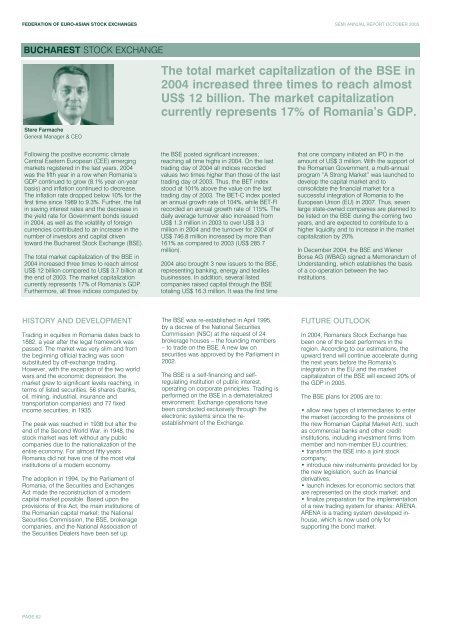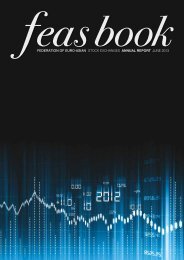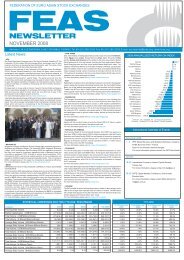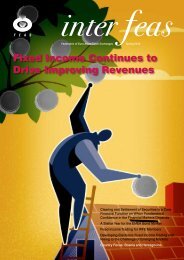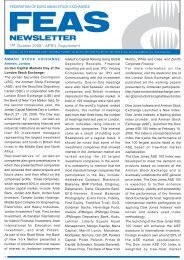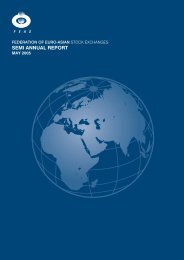Download - FEAS
Download - FEAS
Download - FEAS
Create successful ePaper yourself
Turn your PDF publications into a flip-book with our unique Google optimized e-Paper software.
FEDERATION OF EURO-ASIAN STOCK EXCHANGES SEMI ANNUAL REPORT OCTOBER 2005<br />
BUCHAREST STOCK EXCHANGE<br />
Stere Farmache<br />
General Manager & CEO<br />
Following the positive economic climate<br />
Central Eastern European (CEE) emerging<br />
markets registered in the last years, 2004<br />
was the fifth year in a row when Romania’s<br />
GDP continued to grow (8.1% year-on-year<br />
basis) and inflation continued to decrease.<br />
The inflation rate dropped below 10% for the<br />
first time since 1989 to 9.3%. Further, the fall<br />
in saving interest rates and the decrease in<br />
the yield rate for Government bonds issued<br />
in 2004, as well as the volatility of foreign<br />
currencies contributed to an increase in the<br />
number of investors and capital driven<br />
toward the Bucharest Stock Exchange (BSE).<br />
The total market capitalization of the BSE in<br />
2004 increased three times to reach almost<br />
US$ 12 billion compared to US$ 3.7 billion at<br />
the end of 2003. The market capitalization<br />
currently represents 17% of Romania’s GDP.<br />
Furthermore, all three indices computed by<br />
HISTORY AND DEVELOPMENT<br />
Trading in equities in Romania dates back to<br />
1882, a year after the legal framework was<br />
passed. The market was very slim and from<br />
the beginning official trading was soon<br />
substituted by off-exchange trading.<br />
However, with the exception of the two world<br />
wars and the economic depression, the<br />
market grew to significant levels reaching, in<br />
terms of listed securities, 56 shares (banks,<br />
oil, mining, industrial, insurance and<br />
transportation companies) and 77 fixed<br />
income securities, in 1935.<br />
The peak was reached in 1938 but after the<br />
end of the Second World War, in 1948, the<br />
stock market was left without any public<br />
companies due to the nationalization of the<br />
entire economy. For almost fifty years<br />
Romania did not have one of the most vital<br />
institutions of a modern economy.<br />
The adoption in 1994, by the Parliament of<br />
Romania, of the Securities and Exchanges<br />
Act made the reconstruction of a modern<br />
capital market possible. Based upon the<br />
provisions of this Act, the main institutions of<br />
the Romanian capital market: the National<br />
Securities Commission, the BSE, brokerage<br />
companies, and the National Association of<br />
the Securities Dealers have been set up.<br />
PAGE 62<br />
The total market capitalization of the BSE in<br />
2004 increased three times to reach almost<br />
US$ 12 billion. The market capitalization<br />
currently represents 17% of Romania’s GDP.<br />
the BSE posted significant increases;<br />
reaching all time highs in 2004. On the last<br />
trading day of 2004 all indices recorded<br />
values two times higher than those of the last<br />
trading day of 2003. Thus, the BET index<br />
stood at 101% above the value on the last<br />
trading day of 2003. The BET-C index posted<br />
an annual growth rate of 104%, while BET-FI<br />
recorded an annual growth rate of 115%. The<br />
daily average turnover also increased from<br />
US$ 1.3 million in 2003 to over US$ 3.3<br />
million in 2004 and the turnover for 2004 of<br />
US$ 746.8 million increased by more than<br />
161% as compared to 2003 (US$ 285.7<br />
million).<br />
2004 also brought 3 new issuers to the BSE,<br />
representing banking, energy and textiles<br />
businesses. In addition, several listed<br />
companies raised capital through the BSE<br />
totaling US$ 16.3 million. It was the first time<br />
The BSE was re-established in April 1995,<br />
by a decree of the National Securities<br />
Commission (NSC) at the request of 24<br />
brokerage houses – the founding members<br />
– to trade on the BSE. A new law on<br />
securities was approved by the Parliament in<br />
2002.<br />
The BSE is a self-financing and selfregulating<br />
institution of public interest,<br />
operating on corporate principles. Trading is<br />
performed on the BSE in a dematerialized<br />
environment: Exchange operations have<br />
been conducted exclusively through the<br />
electronic systems since the reestablishment<br />
of the Exchange.<br />
that one company initiated an IPO in the<br />
amount of US$ 3 million. With the support of<br />
the Romanian Government, a multi-annual<br />
program “A Strong Market” was launched to<br />
develop the capital market and to<br />
consolidate the financial market for a<br />
successful integration of Romania to the<br />
European Union (EU) in 2007. Thus, seven<br />
large state-owned companies are planned to<br />
be listed on the BSE during the coming two<br />
years, and are expected to contribute to a<br />
higher liquidity and to increase in the market<br />
capitalization by 20%.<br />
In December 2004, the BSE and Wiener<br />
Borse AG (WBAG) signed a Memorandum of<br />
Understanding, which establishes the basis<br />
of a co-operation between the two<br />
institutions.<br />
FUTURE OUTLOOK<br />
In 2004, Romania's Stock Exchange has<br />
been one of the best performers in the<br />
region. According to our estimations, the<br />
upward trend will continue accelerate during<br />
the next years before the Romania’s<br />
integration in the EU and the market<br />
capitalization of the BSE will exceed 20% of<br />
the GDP in 2005.<br />
The BSE plans for 2005 are to:<br />
• allow new types of intermediaries to enter<br />
the market (according to the provisions of<br />
the new Romanian Capital Market Act), such<br />
as commercial banks and other credit<br />
institutions, including investment firms from<br />
member and non-member EU countries;<br />
• transform the BSE into a joint stock<br />
company;<br />
• introduce new instruments provided for by<br />
the new legislation, such as financial<br />
derivatives;<br />
• launch indexes for economic sectors that<br />
are represented on the stock market; and<br />
• finalize preparation for the implementation<br />
of a new trading system for shares: ARENA.<br />
ARENA is a trading system developed inhouse,<br />
which is now used only for<br />
supporting the bond market.


